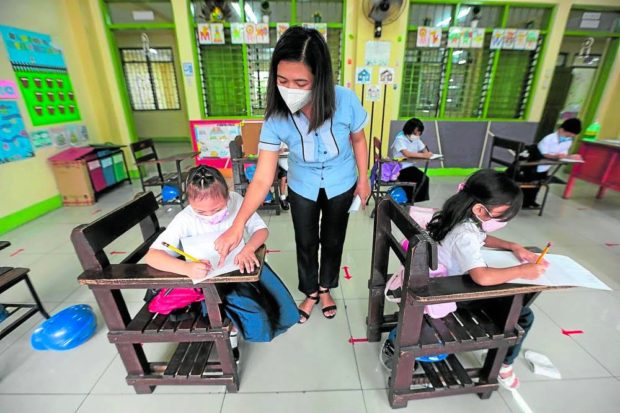ADB: Give students longer study time to recover from pandemic gaps

FILE PHOTO: A teacher and her students learn together at the Pedro Cruz Elementary School in San Juan City as it reopened its face-to-face classes on Thursday, February 10, 2022. INQUIRER/GRIG C. MONTEGRANDE
MANILA, Philippines—With schools in the Philippines and across Asia-Pacific reopening from prolonged closures amid the COVID-19 pandemic, the Asian Development Bank (ADB) has joined calls to extend students’ study time so they can recover from learning losses.
“School closures led to substantial learning losses that urgently need to be recovered to prevent lasting impacts on student progression, human capital formation, and livelihoods,” read an ADB report titled “How to Recover Learning Losses from COVID-19 School Closures in Asia and the Pacific,” published on Monday (July 18).
“A key first step after schools safely reopen is to test students to determine how much knowledge was lost or forgone and at what level to restart instruction, after which attention should focus on regularly tracking the progress of learning,” the Manila-based multilateral lender said.
According to the ADB, schools across developing Asia had been closed for an average of 272 instruction days, or 73 percent of school days between February 2020 and October 2021.
In the Philippines, 100-percent face-to-face classes will resume only in November for the coming school year that starts in August.
“As a result, students in developing Asia are estimated to have lost what they would typically learn in nine-tenths of a school year. A recent review of studies worldwide found that, on average, students lost half a year’s worth of learning,” the ADB said, citing a recent World Bank report.
One way to recover from the learning losses inflicted by the COVID-19 pandemic will be by extending students’ study time.
“Additional classroom time can give students the opportunity to cover material missed because of school closures,” ADB said.
“This can take the form of hours added to the school day, weekend classes, and reducing the breaks between academic years and terms. Dedicating a clear time slot for remedial lessons is also important for effective implementation of targeted instruction,” ADB added.
“Pre-pandemic studies on extending instruction time generally show improvements in student learning, though the results are context specific,” it said.
“Notably, when the school day is short to begin with (such as half a day), students make considerable progress if the school day is extended to a full day. However, there are points of diminishing returns. Beyond a certain number of hours, boredom or fatigue can set in, students make less effort and are less able to concentrate, and absenteeism can rise,” ADB added.
“Summer school programs designed to make up for learning deficiencies can also be effective, especially if instruction is tailored to individuals or small groups. Organizing these programs in a boot-camp format and complementing learning with extracurricular activities can make them more engaging for students,” according to ADB.
Socioeconomic Planning Secretary Arsenio Balisacan earlier urged the public and private education sectors to go on learning catch-up, including make-up classes for younger school children and training or internship for college students.
ADB pointed to similar adjustments in academic calendars elsewhere in the Asia-Pacific region: “In Japan, many schools reduced the length of the summer break. For example, in Nara City, the break was shortened from 34 to 16 calendar days. With this approach, coupled with the use of remote learning during school closures, learning losses were quickly recovered.”
“The Indian state of Odisha cut the break from 48 to 11 days. In Thailand, losses from initial school closures were to be offset by a plan to extend the academic year, increase class hours, provide online self-learning resources, and provide additional take-home exercises. In Nepal, constraints to the use of remote learning during the pandemic led authorities to extend the school year by two months (April to June) in 2021,” the ADB noted.
Besides make-up classes, ADB also urged educators to “teach to the students’ level;” consolidate or streamline the curriculum; strengthen re-enrolment campaigns; as well as train teachers so they can facilitate learning recovery.
“Learning losses due to school closures have been substantial in Asia and the Pacific. Efforts are urgently needed to recover those losses to avoid negative long-term impacts on student learning progression, well-being, future earnings, and economy-wide productivity,” said the ADB report.
“Young people’s economic prospects are in jeopardy at this critical juncture, and students will not catch up by simply returning classrooms under the pre-pandemic status quo,” according to ADB.
TSB
